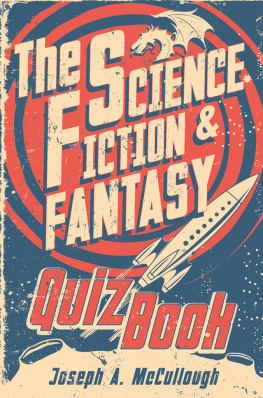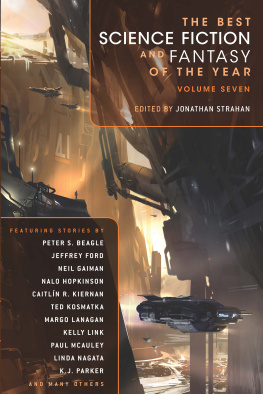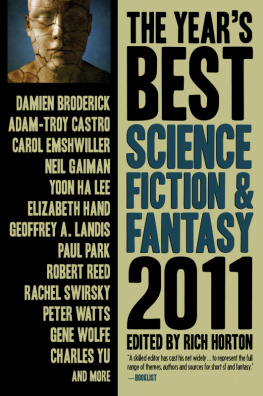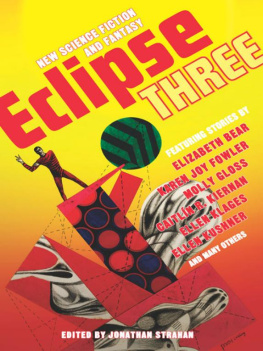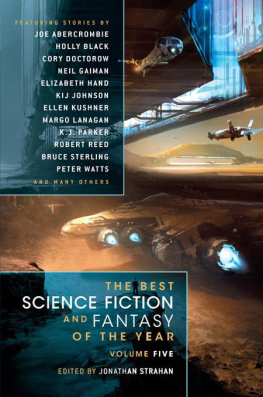Judith Merril - The Year's Greatest Science Fiction & Fantasy
Here you can read online Judith Merril - The Year's Greatest Science Fiction & Fantasy full text of the book (entire story) in english for free. Download pdf and epub, get meaning, cover and reviews about this ebook. year: 1956, publisher: Dell, genre: Science fiction. Description of the work, (preface) as well as reviews are available. Best literature library LitArk.com created for fans of good reading and offers a wide selection of genres:
Romance novel
Science fiction
Adventure
Detective
Science
History
Home and family
Prose
Art
Politics
Computer
Non-fiction
Religion
Business
Children
Humor
Choose a favorite category and find really read worthwhile books. Enjoy immersion in the world of imagination, feel the emotions of the characters or learn something new for yourself, make an fascinating discovery.

- Book:The Year's Greatest Science Fiction & Fantasy
- Author:
- Publisher:Dell
- Genre:
- Year:1956
- Rating:5 / 5
- Favourites:Add to favourites
- Your mark:
- 100
- 1
- 2
- 3
- 4
- 5
The Year's Greatest Science Fiction & Fantasy: summary, description and annotation
We offer to read an annotation, description, summary or preface (depends on what the author of the book "The Year's Greatest Science Fiction & Fantasy" wrote himself). If you haven't found the necessary information about the book — write in the comments, we will try to find it.
The Year's Greatest Science Fiction & Fantasy — read online for free the complete book (whole text) full work
Below is the text of the book, divided by pages. System saving the place of the last page read, allows you to conveniently read the book "The Year's Greatest Science Fiction & Fantasy" online for free, without having to search again every time where you left off. Put a bookmark, and you can go to the page where you finished reading at any time.
Font size:
Interval:
Bookmark:
The Years Greatest Science Fiction and Fantasy
Edited by Judith Merril
INTRODUCTION
by ORSON WELLES
One things sure about science-fiction: theres too much of it.
A leading editor in the field announces that the boom days are over, but the yearly amount of the stuff that still gets into print is pretty staggering.
My advice to any but the most bug-eyed addict would be to abstain from the novels. S.F. is often at its aching worst in book-length versions. Good novels (Heinleins Puppet Masters, for instance) are about as rare as ambergris and a lot harder to identify. My wife, who loathes everything remotely galactic, who alternately yawns and shudders at the prospect of journeying in either time or outer space, and herself travels almost exclusively by train, went shopping with a publishera friend of ours who claims to be an S.F. expertand presented me on Christmas with an eight-foot shelf of this seasons crop of the novels. Ploughing through the bulk of this brightly-jacketed little library only confirmed a previous opinion: one of the oddest aspects of this whole publishing phenomenon is that there still seems to be more outright claptrap between hard covers than soft, and that the short stories come off much better than the long ones.
Why? Well, I guess these tales are, after all, our modern fables and its certain that the fable as a form generally succeeds when not too extended.
If there remains such a thing as a novice reader in this literature, my suggestion would be for him to begin with the magazines until he knows a few authors, and to steer clear of the bookstores. Against this, of course, our theoretical novice might happen on a poorish issue of whatever monthly he sampled first. An anthology is probably best for a beginning, and I dont think he could do better than with this one.
For the real aficionado hell be relieved to find that he has nothing familiar from other collections to skipI reckon hell find most of his favorite authors, and these at the top of their form. The range is interestingly widefrom that convincing gadgetry dear to many of the fans, to the wildest and freest sort of nonsense. In this last area I join the enthusiasts. Its by bringing pure fantasy into currency that science-fiction makes its real and very healthy contribution to our popular literature, at least for my money.
Im going to try to persuade my wife to read this book. Theres a good hope that a first-rate sampler such as this may convert even her. If S.F.The Years Greatest Science-Fiction and Fantasy doesnt sell her on our twentieth-century fairy tales, shell just have to stick with the Grimm brothers.
PREFACE
The stories in this book, says Mr. Orson Welles, are fables of our time. I think this is a good way to describe them since, like older fables, science-fantasy makes use of the imaginative background and unusual circumstance to add emotional urgency and dramatic power to what are basically problems in philosophy and morality.
Unlike Aesop, the writers of these stories seldom conclude with a clear-cut moral. In a century whose most impressive accomplishments (atom bombs, orlon, rockets, radar, cancer cures, what-have-you-?) are built upon scientific concepts with such names as relativity and the uncertainty principle, the inquiring artist does well merely to formulate a coherent question.
The questions you will find most often put in here might be compressed in one composite query:
How can we learn to live at peace with ourselves and with each other in the complexities of the world we are rebuilding with our new machines?
Fortunately, the stories are not so compressed. A good story must inevitably be unique and individual as the man or woman who wrote it. Unfortunately, if its answers that you want, you will not find them hereexcept occasionally, prefaced with what if?, I wonder, or supposing that . . .
The serious-minded reader will also have to forgive our authors if they resort to the frivolities of space-ships and flying bath-mats, robots and talking rats, to make their points. Even in s-f, a writer is only secondarily a philosopher; his first big job is entertainment.. . and that hasnt changed since Aesops time at all.
-J.M.
THE STUTTERER
by R. R. Merliss
Right now, today, we canand dobuild machines that can think logically better and faster than we can. Others in our growing arsenal of tools can hear better, see farther, hit harder, last longer, remember more accurately. We have not yet built anything to live livelier, feel more strongly, or dream at all. We have not learned how to make a soulyet.
The Stutterera first story, by the way, written by a Los Angeles physicianpresents the problems (and tough ones they are) of an android, an artificial man, built to be as much as possible exactly like a human beingwith just two very important differences. He is not fertile; he is indestructible.
* * * *Out of the twenty only one managed to escape the planet. And he did it very simply, merely by walking up to the crowded ticket window at one of the rocket ports and buying passage to Earth. His Army identification papers passed the harassed inspection of the agent, and he gratefully and silently pocketed the small plastic stub that was handed him in exchange for his money.
He picked his way with infinite care through the hordes of ex-soldiers clamoring for passage back to the multitudinous planets from which they had come. Then he slowly climbed the heavy ramp into the waiting rocket.
He saw with relief that the seats were strongly constructed, built to survive the pressure of many gravities, and he chose one as far removed as possible from the other passengers.
He was still very apprehensive, and, as he waited for the rocket to take off, he tried hard to remember the principles of the pulse drive that powered the ship, and whether his additional weight would upset its efficiency enough to awaken suspicion.
The seats filled quickly with excited hurrying passengers. Soon he heard the great door clang shut, and saw the red light flicker on, warning of the take-off. He felt a slow surge of pressure as the ship arose from the ground, and his chair creaked ominously with the extra weight. He became fearful that it might collapse, and he strained forward trying to shift some of the pressure through his feet to the floor. He sat that way, tense and immobile, for what seemed a long time until abruptly the strain was relieved and he heard the rising and falling whine of the rockets that told him the ship was in pulse drive, flickering back and forth across the speed of light.
He realized that the pilots had not discovered his extra weight, and that the initial hazards were over. The important thing was to look like a passenger, a returning soldier like the others, so that no one would notice him and remember his presence.
His fellow travelers were by this time chatting with one another, some playing cards, and others watching the tele-depth screens. These were the adventurers who had flocked from all corners of the galaxy to fight in the first national war in centuries. They were the uncivilized few who had read about battle and armed struggle in their history books and found the old stories exciting.
They paid no attention to their silent companion who sat quietly looking through the quartz windows at the diamond-bright stars, tacked against the blackness of infinity.
The fugitive scarcely moved the entire time of the passage. Finally when Earth hung out in the sky like a blue balloon, the ship cut its pulsations and swung around for a tail landing.
The atmosphere screamed through the fins of the rocket, and the continents and the countries, and then the rivers and the mountains took shape. The big ship settled down as gently as a snowflake, shuddered a few times and was quiet.
Font size:
Interval:
Bookmark:
Similar books «The Year's Greatest Science Fiction & Fantasy»
Look at similar books to The Year's Greatest Science Fiction & Fantasy. We have selected literature similar in name and meaning in the hope of providing readers with more options to find new, interesting, not yet read works.
Discussion, reviews of the book The Year's Greatest Science Fiction & Fantasy and just readers' own opinions. Leave your comments, write what you think about the work, its meaning or the main characters. Specify what exactly you liked and what you didn't like, and why you think so.

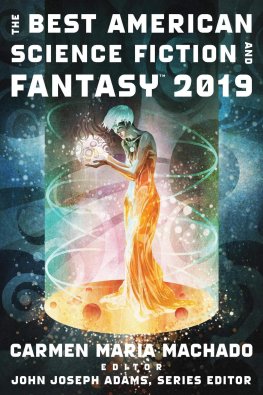
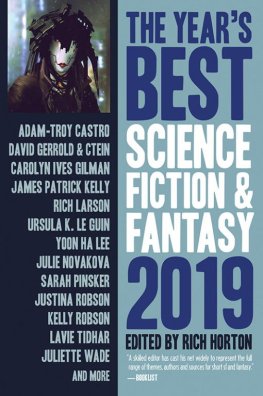
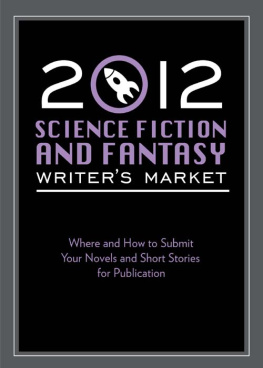

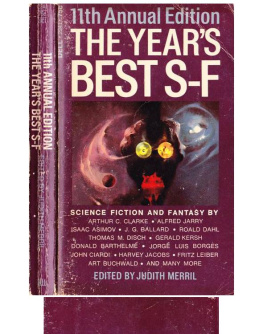
![Merril - The Years Greatest Science Fiction & Fantasy 1: [Anthology]](/uploads/posts/book/220111/thumbs/merril-the-year-s-greatest-science-fiction.jpg)
